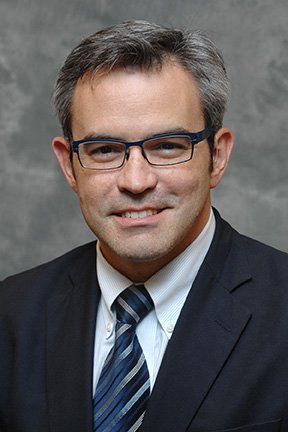Sandra Ryan speaks to Dr Victor Montori about why patients need to take the lead in reforming the healthcare system for their benefit and to improve the working lives of doctors
Dr Victor Montori, endocrinologist and researcher at the Mayo Clinic, US, is one of the most cited clinical researchers in the world, having authored or co-authored over 580 research articles. In 2016, Dr Montori founded The Patient Revolution, a non-profit organisation dedicated to “advancing careful and kind patient care for all”.
His book, Why We Revolt, is a series of personal essays describing what is wrong with industrial Western health systems and proposes a revolution of compassion and kindness in healthcare.

Dr Montori was keynote speaker at the recent RCPI ‘Person Centred Care’ conference, held on 29 January in Dublin. He spoke to the Medical Independent ahead of the event about his life-long ambition to change current healthcare priorities in order to place a much greater priority on patient involvement and care.
While this goal echoes many other similar drives for patient-centric care, there is one big difference — Dr Montori strongly believes that the current health system is not equipped to deliver it, and that considerable change is needed.
The healthcare machine
“Healthcare is increasingly seen as an industrial activity,” Dr Montori said. “It is a machine that needs to open access to care to people — and deliver that care to people — for purposes of efficiency; of keeping the system going. This is a system that ultimately, unfortunately, benefits from keeping clinicians and patients interchangeable.”
Expanding on this point, Dr Montori described current industrialised health systems as ones in which it is extremely hard to practice “kind and patient-centred care”.
“In these systems, both the patient and the clinician become dehumanised, which creates a vicious cycle of cruelty and lack of empathy for each other. When we do take the time to connect with patients and care, it is almost by accident.”
Crucial to Dr Montori’s definition of “patient-centred care” is a system that promotes and facilitates shared decision-making, as well as evidence-based medicine.
“It all starts by caring enough to engage the patient in the decision-making. Many people argue that ‘we don’t have time for this in the consultation; I’d rather just tell people what I think is best for them and then they can decide whether they want it or not.’ Well, that’s not very caring. This might be efficient, but it does not reflect the best that we can offer as doctors,” Dr Montori said.
He also believes that patients with chronic conditions, such as diabetes, are often exposed to poorly co-ordinated healthcare that pursues goals that may differ from those of the patient.
“As a result, their care is complex and often overwhelming, with lower-quality outcomes than expected,” he said. As an example of this, he mentions diabetes care, where, he believes, patients can often be over-treated.
“The historical focus in type 2 diabetes, for example, is to try and achieve low blood sugar with a focus on HbA1c testing. We have convinced ourselves and the patient that this is the final grade on efforts to treat them. We can conclude so many things from this HbA1c test that we often don’t see the patient in their whole complexity and whole life — we just see them as being the result of that particular test, and we respond to that test usually by just changing their drug therapy.”
This type of engagement between doctor and patient is “purely transactional”, according to Dr Montori.
In these chronic disease situations, he believes that doctors should simply “back off a little” and give patients room to breathe.
Minimally-disruptive medicine
Care for such diseases is often so complex, Dr Montori said, it overwhelms patients and makes it hard for them to follow their treatment regimens. His solution —minimally-disruptive medicine — is gaining interest among policy-makers in both Europe and the US.
He explained that minimally-disruptive medicine is essentially healthcare designed to achieve the goals of patients, while “imposing the smallest possible footprint on their lives”.
“Patients and clinicians can work together in deciding which treatments to take, prioritising those most likely to help our patients achieve their goals and dreams. Then, we need to deliver these treatments in a way that is mindful of the work required and patients’ capacity to get this work done,” he said.
Dr Montori argued that the current system does not allow for this, mainly because healthcare systems and doctors are not being recognised for reducing the number of visits and tests.
“We don’t have any guidelines or quality-of-care measures [for that]. So, doctors are placed in a conflicted position: To focus on what matters to patients and fits, or to satisfy these quality-of-care measures. We have to give clinicians permission to refocus on what is important for patients and deliver it in ways that fit their context.”
Patients with multiple chronic conditions are particularly at risk of “overwhelming care”, Dr Montori stated.
“For these patients, who represent about 5 per cent of all patients and yet account for about 40 per cent of all healthcare costs and service consumption, getting less care, but getting care they need, want and can implement, would offer better value. The opposite, of course, is true for people who get less care than they need.”
Dr Montori describes an ideal three-pronged approach to the care of patients with many chronic conditions.
“At the Mayo Clinic, we are also working to ensure we know what matters to patients. What patients really want is often not to have better blood pressure or lower cholesterol. What they usually want is to feel better, not die before their time, and be able to do what they need to do to fulfil their obligations and pursue their dreams. We must commit to work toward our patients’ goals.”
Next, he and his team are focused on implementing shared decision-making, using point-of-care tools that help with issues such as which medicine to take for diabetes or whether to take statins or aspirin to reduce the risk of heart attack, for example.
Finally, Dr Montori said, they are working hard to understand patients’ capacity.
“We are testing an approach to uncover patients’ health literacy and resilience; their mental, physical, and financial health; the quality of their support network; and of the environment in which they live. We want to know what resources they have which can be optimised to face the complexity of caring for their conditions.”
Dr Montori passionately believes that such changes to the system will benefit doctors in numerous ways.
“In the current system, clinicians have much to lose. I don’t mean money, or a job — I mean the ability to draw meaning from the work that they do. There is a huge problem of clinician burnout in the current system.”
Finally, Dr Montori said that there is little doctors can do to make these changes from within the system. The change must come from outside.
“Making these changes — it’s not on doctors. Doctors are too overwhelmed. Change must be led from the public; the patients and caregivers, and students, have to lead that change — once the movement is afoot doctors will benefit.”













Leave a Reply
You must be logged in to post a comment.